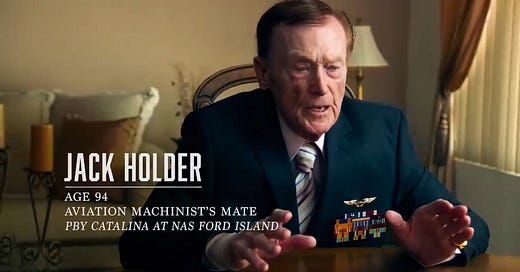Government is the business of war & nothing more
No one should be surprised that Pearl Harbor was not a surprise. (Same can be said for 9/11, among other ambushes orchestrated by the Administrative State...)
82 years ago today Pearl Harbor was attacked which gave the US an excuse to enter World War II. FDR provoked Japan and then ignored the coming attack on Pearl Harbor. He knew the attack was coming and could have saved lives. The US wanted a fight and used its military as cannon fodder. Politicians will use any means to justify entering a war...even outright deceit and lies. You have to understand that war is the health of the state. They love war. This is how the government grows in power and size and also justifies its endless spending. This is how you lose freedom and governments gain more power. At the end of this video, you may notice many of these men just wanted peace. The common man doesn't wish for war and often after it is over they see their perceived enemies for what they are... themselves. "But now, for the first time, I see you are a man like me. I thought of your hand-grenades, of your bayonet, of your rifle; now I see your wife and your face and our fellowship. Forgive me, comrade. We always see it too late. Why do they never tell us that you are poor devils like us, that your mothers are just as anxious as ours, and that we have the same fear of death, and the same dying and the same agony — Forgive me, comrade; how could you be my enemy?" - Erich Maria Remarque (All Quiet on the Western Front)
click for video
Pearl Harbor: The Seeds and Fruits of Infamy
Excerpt (emphasis mine) —>
A president faced an economic depression that wouldn't go away, and a deeply disgruntled electorate. Not for the first or last time, the option of entering a war seemed politically appealing. How badly did FDR want a war and to what lengths was he willing to go to get one? The questions have vexed historians for many decades.
Pearl Harbor: The Seeds and Fruits of Infamy by Percy Greaves, Jr. (1906-1984), published for the first time in 2010, blows the top off a 70-year cover-up, reporting for the first time on long-suppressed interviews, documents, and corroborated evidence.
The first section (the seeds) provides a detailed history of pre-war U.S.-Japan relations, thoroughly documenting the sources of rising tension. The second section (the fruits) shows that the attack on December 7, 1941 was neither unexpected nor unprovoked. Nor was it the reason that Franklin Roosevelt declared a war that resulted in massive human slaughter. Instead, in exhaustive detail, this book establishes that Pearl Harbor was permitted as a public relations measure to rally the public, shifting the blame from the White House, where it belonged, to the men on the ground who were unprepared for the attack.
For 70 years, Greaves's documents have been the primary source of revisionist scholarship on Pearl Harbor. These documents were prepared under his leadership as main counsel for the Republican minority on the Joint Congressional Committee that investigated Pearl Harbor from 1945 to 1946.
More than any other person, he was qualified to speak on this subject. He possessed encyclopedic knowledge and had access to research available to no one else. He conducted in-person, detailed, comprehensive interviews with all the main players at Pearl Harbor and many people in the security apparatus. The contents of these interviews are further corroborated by military records.




